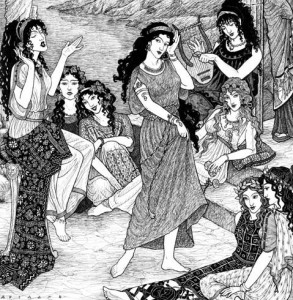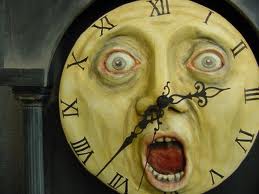Invocation of The Muses

One of Steven Pressfield’s main topics of focus in The War of Art is the fight against what he calls Resistance — the unrelenting struggle a writer faces to NOT write. Every day a writer has to push forward and make the writing happen. You just can’t wait for inspiration, at least not if you’re going to write professionally.
I’ve found that The War of Art is one of the most useful writing books I’ve ever read because of its description of and advice about waging the battle against Resistance (note the capital R — you must respect the enemy). To help me do battle, one of my tactics is to recognize that when you sit down to write, you’re entering a different kind of mental state. I tell writing students that just as a professional athlete would not simply arrive at the track field and start sprinting, a writer will be poorly served to jump into the seat and immediately start typing.
It’s my thought that you have to acknowledge that change, that transition from one mental state (where you’re worrying about groceries and laundry or that news article) to another where the story is all, in order to do good work.
On the first page of The War of Art, Pressfield describes what he does each day to prepare to write so that he can be in the proper frame. Amongst several other personal rituals, Pressfield says a prayer. His is the Invocation of the Muse from Homer’s Odyssey, translated by T.E. Lawrence (that’s Lawrence of Arabia, incidentally).
I’ve never been much of a praying man myself, but I liked the sound of this, so I looked up the prayer, which I had read as a school boy and probably blipped over.
 First, I want to point everyone
First, I want to point everyone  Once upon a time, I had the crazy idea that if a book was good, it would stay in print. I also figured that a “best-of” volume would probably have all the good stories from an author, and I was actually naive enough to think that if a work by a favorite author was out of print, it probably wasn’t as good as the work that was still on shelves.
Once upon a time, I had the crazy idea that if a book was good, it would stay in print. I also figured that a “best-of” volume would probably have all the good stories from an author, and I was actually naive enough to think that if a work by a favorite author was out of print, it probably wasn’t as good as the work that was still on shelves. I think my favorite parts of Alexander the Great’s life involve his fight with the dragon, and the time he climbed to a mountain summit and saw the angel of death. Not to mention his conversation with the speaking tree. After that, his meeting with the Emperor of China was almost superfluous.
I think my favorite parts of Alexander the Great’s life involve his fight with the dragon, and the time he climbed to a mountain summit and saw the angel of death. Not to mention his conversation with the speaking tree. After that, his meeting with the Emperor of China was almost superfluous. I’m busy.
I’m busy. I should probably blame the whole thing on John O’Neill and Eric Knight.
I should probably blame the whole thing on John O’Neill and Eric Knight. I spoke to some creative writing students at a local university last Friday and I tried to tell them something it took me a long time to understand: when you begin your writing career, you’re joining a community.
I spoke to some creative writing students at a local university last Friday and I tried to tell them something it took me a long time to understand: when you begin your writing career, you’re joining a community. If you’re a gamer, you’ve probably heard of the renowned Traveller role-playing game of science fiction in the far future. And if you’ve played Traveller recently, you MAY have heard of
If you’re a gamer, you’ve probably heard of the renowned Traveller role-playing game of science fiction in the far future. And if you’ve played Traveller recently, you MAY have heard of  I realized yesterday that my hard learned lesson about publishing (“it’s a long distance run, not a sprint”) can’t help someone dying of cancer. What do you say to someone who will mostly likely be dead before she reaches the age you were when you first got a book contract?
I realized yesterday that my hard learned lesson about publishing (“it’s a long distance run, not a sprint”) can’t help someone dying of cancer. What do you say to someone who will mostly likely be dead before she reaches the age you were when you first got a book contract?